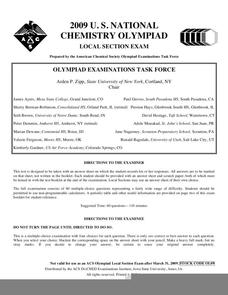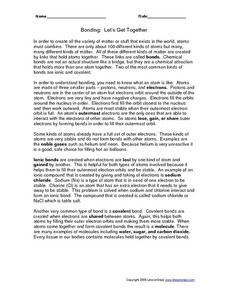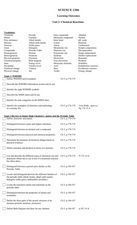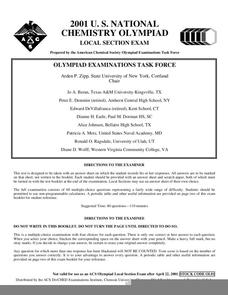Curated OER
Physical Science Quiz
Test your class with a physical science quiz. Learners explain chemical processes, name compounds, write formulas for chemical compounds, balance equations, and more.
Curated OER
How Do Atoms Stick Together?
In this chemical bonding activity, learners answer 10 questions about ionic bonding, covalent bonding, metallic bonding, Lewis structures, and intermolecular forces.
Curated OER
Chemical Bonding
In this chemical compounds worksheet, high schoolers review the different types of bonding, define the octet rule, and draw Lewis structures (electron-dot diagrams) for given compounds. This worksheet has 7 fill in the blank, 5 short...
Curated OER
Chemical Context of Life & Water
Some basic chemistry concepts are fundamental to understanding biology. Learners explore how molecular structure plays a role in biological processes, especially the structure of the water molecule. The final page focuses on water's...
Curated OER
2009 U. S. National Chemistry Olympiad - Local Section Exam
Here is a copy of a past national challenge exam that you can use in your general chemistry course as a unit or semester review. Sixty multiple-choice questions query learners on properties of matter, stoichiometry, reactions, and...
Curated OER
2009 U.S. National Chemistry Olympiad National Exam - Part I
The 2009 version of the first part of a national chemistry competition is posted for your use with olympiad hopefuls. Test takers deal with 60 multiple choice questions covering an entire year of chemistry curriculum. Use this to...
Curated OER
Comparing Covalent and Ionic Substances
In this covalent and ionic substances worksheet, students use the internet to find information about the characteristics of covalent and ionic substance and explain what causes the differences in these types of substances.
It's About Time
How Atoms Interact with Each Other
Connect the dots and assist young chemists as they demonstrate covalent and ionic bonding. Class members use their knowledge of valence electrons to predict compound formulas as they arrange electrons into various bonding structures to...
Curated OER
Ionic Compounds
In this compounds worksheet, students review the structure and properties of ionic compounds, their formulas and nomenclature, and molecular mass and percentage composition. This worksheet has 4 short answer questions and 7 problems to...
Curated OER
Chemistry of Life Study Guide
Biology learners should understand a few chemistry basics. Here is a worksheet that introduces them to the concepts of chemical reactions, molecular bonding, and the unique combination of properties that make water vital to life....
Curated OER
Sample Midyear Examination (Chemistry and Biology)
A 12-page midterm exam sample can be given to young scientists in preparation for an exam. This particular installment is geared toward a class that delves into both ecology and chemistry concepts. There is no way to separate the 50...
Curated OER
Bonding: Let's Get Together
In this atom instructional activity, students read 5 paragraphs about ionic bonds. Students answer 2 true/false questions, 4 fill in the blank, 3 multiple choice, and 1 short answer question.
Curated OER
Bonding Basics Practice Page
In this chemistry worksheet, students complete each of the bonds listed. They draw the Lewis structures for each atom and show the transfer of electrons and charge for each ion. Students also draw the Lewis structures for each atom and...
Pingry School
Comparing Activities of Selected Metals
Don't overreact! A simple experiment demonstrates chemical reactions as scholars mix chemical solutions and metals in a large well plate. They note all changes to the metals, solutions, precipitate, colors, and more. A full data table...
Curated OER
Ionic and Covalent Bonds
Ionic and covalent bonds are the focus of this chemistry activity, which provides learners with eighteen key terms to use in a fill-in-the-blank activity. Additionally, students are prompted to write the number of atoms in four given...
Curated OER
Bonding Basics - Ionic Bonds
In this chemistry activity, students complete the chart for each of the listed elements, including the number of protons, electrons, and valence electrons. Then they complete each of the ionic bonds that follows.
Curated OER
Learning Outcomes
In this science worksheet, learners explore the learning outcomes for a unit on chemical reactions. Students define 60 vocabulary words and answer a list of questions for each topic.
Curated OER
Chemical Reactions
In this reactions worksheet, students state the differences between a coefficient and subscript and an exothermic and endothermic reaction. Students review the different types of reactions. This worksheet has 13 short answer questions.
Curated OER
The Ties that Bind
In this bonding worksheet, students read about the types of bonds that hold compounds together. They are given fifteen common materials and they identify the types of bonds that hold each together.
Curated OER
Nomenclature Review
In this nomenclature worksheet, learners are given the formulas for ionic compounds, molecular compounds and inorganic acids and they write their names. They also write the formulas given the names of ionic compounds, molecular compounds...
Curated OER
2001 U.S. National Chemistry Olympiad - Local Section Exam
Sixty multiple-choice chemistry questions make up this comprehensive exam used for the 2001 US National Chemistry Olympiad. Every topic that you would expect to approach in a general chemistry class is queried on. You could easily use...
Curated OER
Naming More Compounds
In this naming compounds worksheet, students are given the chemical formulas of sixty ionic and covalent compounds and they name each.
Curated OER
Elements and Bonding Worksheet
In this elements and bonding worksheet, students classify given elements, they identify valence electrons in atoms, they explain the reactivity of elements, and they explain why certain atoms gain electrons while others lose electrons.
Curated OER
2004 U.S. National Chemistry Olympiad Exam Part II
In this National Chemistry Olympiad test, junior chemists answer eight problem solving questions on a variety of topics. These include calculating molarity of solutions, determining rates of reactions, calculating decay and discussing...

























